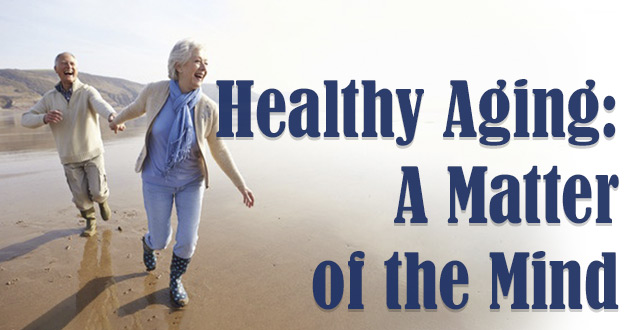Aging brings with it a battery of health concerns, from aches and pains to increased disease susceptibility. But while certain aspects of your health can’t be controlled, how quickly and severely your body ages might be up to you. In fact, healthy aging begins with a healthy mindset, which can make all the difference in how you take care of yourself through the senior years. So don’t think you can’t live a long, healthy life no matter what your health worries. All it may take is setting your mind to it.
Knowledge is Power
Brushing up on your genetics and family health history may not be how you want to spend your leisure time, but it’s a task that will pay off big. According to the Center for Disease Control and Prevention, knowing your family medical history and then acting on that knowledge can help you avoid disease down the road.
Start with your immediate family and work your way up the family tree. Ask family members questions about their health, including diseases they’ve had, and be sure to document and update the information. Check with relatives who may have information about deceased family members, too. Be sure to share findings with your doctor. Together, you can stay on top of your health and help prevent and minimize health problems related to genetics.
You can also do general research on healthy aging. Books, magazines, and the Internet are all great sources for learning about common health concerns for aging adults. Be careful with what you read, though; stick to reliable news outlets and sources, and be sure to verify anything that’s of particular concern to you.
Empowering your mind with knowledge won’t just help you stay healthy and disease-free; you’ll gain confidence about your well-being—and that in itself can slow the aging process.
Can Optimism Boost Longevity?
According to studies, people who see the glass half full may live longer. Research published in the American Journal of Epidemiology found that older women who have an optimistic outlook tend to have improved health. Over 70,000 women with an average age of 70 participated in the study. Those who were most optimistic had a roughly 30 percent lower risk of dying during the six-year follow-up than the less optimistic participants.
Another team of researchers studied data from the Health and Retirement Study survey and discovered that optimism rose between the ages of 50 and 70—and along with it, improved self-rated health and fewer chronic illnesses. Optimism was attributed to a self-determination theory, which holds that people have a better sense of well-being when their core needs—success, independence and a connection to others—are met.
Not prone to optimism? No worries, you can learn it. One way to become more optimistic is to simply smile and laugh more, even during challenging times. You can also cultivate optimism by being more thankful and forgiving, finding engaging activities to occupy your time, and surrounding yourself with optimists. Or, fake it—many pessimists do and surprise themselves at how quickly they adopt a positive mindset.
From Stress to Peace
Stress is a major contributor to rapid aging because it causes all kinds of side effects, including inflammation and lowered immunity. Alleviate stress, and you’ll help slow the aging process drastically.
Of course, shirking stress is hard to do since it pops up regularly in our home life, jobs, social circles, and health. While you can’t necessarily eliminate the stressors in life, you can change how you react to them and learn to manage stress in healthy ways.
Mind-body therapies that combine deep breathing and guided thinking can be especially helpful in slowing age. Numerous studies have shown that mindfulness and other forms of meditation reduce the shortening of telomeres, protective protein caps found at the end of our DNA. Telomeres naturally get shorter with age, but the process speeds up when stress come into play. For an introduction to mindfulness, the UCLA Health website offers free mindfulness meditations to try.
Living in the Present
If you spend a lot of time worrying about the past and the future, you’re not alone. But it’s a bad mindset, especially for older adults. Focusing on the past and future conjures up feelings of regret, anxiety, and fear, all which can be stagnating and lead to bad health behaviors for relief.
Concentrating on the present is much healthier because it encourages productivity. No one knows what the future will bring and there’s nothing you can do to change the past, so why bother dwelling on either? A mindset that’s focused on the here and now allows you to enjoy today to its fullest and with a more energized perspective. Simply put, when you live in the present, you have no time to think about aging.
Bottom line? Don’t let the aging process ruin your health and longevity. You can’t slow down the years, but you can curb the signs and symptoms of age by changing your mindset. Not only will you look and feel better, you’ll have more confidence in a long and healthy future.
Links:
https://www.cdc.gov/features/familyhealthhistory/
http://www.reuters.com/article/us-health-optimism-longevity-idUSKBN13Y27K

